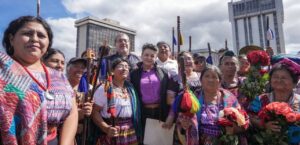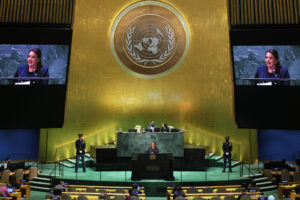By Geoff Thale*
Nine retired officials of the Salvadoran armed forces, including four former members of the military’s high command, are in custody in El Salvador, in response to an international arrest warrant issued by Interpol. The warrant was requested by a Spanish judge who has charged twenty former Salvadoran military officials with acts of terrorism and crimes against humanity for their part in ordering the assassination of six Jesuit priests and their two housekeepers during El Salvador’s civil war.
The Jesuit priests, their housekeeper and her teen-age daughter were assassinated in November of 1989. The Jesuits were well-known, both in El Salvador and internationally, for their defense of human rights in El Salvador, their work supporting war refugees and migrants, and their engagement in the search for a negotiated end to El Salvador’s civil war. Their brutal murders called international attention to the human rights crisis in El Salvador. When evidence suggested that the Salvadoran military was behind the slaying, revulsion at the brutality of the military contributed to a new climate and new pressures for a negotiated solution. Peace Accords were signed in January of 1992, after twelve years of civil war.
In the 1980s, WOLA had worked closely with several of the Jesuits who were killed on human rights advocacy and support for a peace process. WOLA staff and board members felt this case personally, and WOLA has long supported the demand for justice in the case of the Jesuits.
Progress on this high profile case could bring some measure of justice for the Jesuit community, and for the families and friends of those who were slain. It would offer some hope to the families of thousands of other Salvadorans who died or disappeared during the armed conflict. And it would signal that the culture of impunity – in which well-connected political figures can engage in criminal activity without fear of prosecution or punishment – might be coming to an end.
Until recently, there was little movement in the case. In 1991, under intense international pressure, a colonel, two lieutenants, a sub-lieutenant, and five soldiers were tried for the killing of the Jesuits. Only the colonel and one of the lieutenants were convicted; then a 1993 amnesty law spared them significant prison time. A 2000 decision by a Salvadoran court ruled that further prosecutions of any others who might have been involved in the decision to kill the Jesuits were proscribed.
In 2008, the U.S.-based Center for Justice and Accountability (CJA) and the Spanish Association for Human Rights opened a legal action in Spain against a number of Salvadoran military and political leaders, arguing that the principle, accepted in Spanish courts, of universal jurisdiction for crimes against humanity, along with the fact that five of the six murdered Jesuits were Spanish citizens, allowed investigation and prosecution of the case.
On May 30th of this year, after an extensive investigation, Spanish judge Eloy Velasco charged twenty military officers for their role in ordering or participating in the killings. Judge Velasco’s decision was an important step forward in a case that had been stalled for a number of years. WOLA hopes that the case will move forward and that it will open the door for further investigations and prosecutions of egregious war-time human rights abuses in El Salvador, which have been prevented by the post-war amnesty. (In a number of other Latin American countries where amnesty laws have prevented investigation and prosecution of wide-spread human rights abuses by military and political figures, international arrest warrants have provoked domestic debates about and modifications of the amnesty provisions, helping to provide some measure of justice for victims and their families.)
Judge Velasco issued the indictments at the end of May. In late July, he requested that Interpol issue international arrest warrants for the nine military officials whose location was known, so that they could be held pending extradition procedures. (It is believed that several of the other former officers are in the United States; a State Department spokesperson recently said that the U.S. Justice Department will give any request for assistance from Spanish officials “appropriate consideration,” noting the importance of human rights issues in Central America.)
The government of President Mauricio Funes acted appropriately in this politically sensitive situation.The director of the police made clear that the police would detain the military officers when the Interpol warrants were received. Word filtered out late in the first week of August that the warrants were about to be executed, and on Sunday, August 7th, the nine military officials turned themselves in to an army base in El Salvador, rather than to civilian authorities. Analysts speculated that the officers hoped to invoke the protection of the military and avoid the civilian legal process, but on Monday morning, the Minister of Defense put the officers at the disposition of a civilian judge. By Tuesday, August 9th, the case had been turned over to the Supreme Court, which will soon name a special magistrate to handle the legal procedures in the extradition process. Despite political pressures, the government has complied with its obligations in assuring that the indicted officials are in custody, and subject to a judicial process. This is an important affirmation of the government’s commitment to international law.
The Salvadoran Supreme Court will decide what happens next in this case. The Spanish government must follow up on Judge Velasco’s arrest warrant with a formal extradition request. Spain and El Salvador have an extradition treaty. After the Foreign Ministry of El Salvador receives the request from the Spanish government, the Supreme Court will review the request and decide whether or not to honor it.
The officers who were detained on Monday will argue that extradition request should not be honored because of the 1991 trial and the amnesty law. There is some concern that the Supreme Court will rule in their favor. When Judge Velasco wrote last year to the Supreme Court seeking documents related to his investigation, a majority of the justices voted not to forward them. This suggests that the Court, when it considers the extradition request and the argument of the officers, may vote not to extradite.
WOLA hopes that the Court will permit the extradition, in compliance with El Salvador’s obligations. If prosecutions of those charged with having ordered and carried out the brutal murder of the Jesuits cannot move forward in El Salvador, the Court should allow extradition and permit them to move forward in Spain.
*Geoff Thale is program director at WOLA. Thale is an expert on citizen security, U.S.-Cuba relations, and Central America. Thale has been involved with El Salvador issues since the mid-1980s. He followed the negotiations to end El Salvador’s civil war and the construction of post-war institutions, and has written and spoken extensively about El Salvador.


